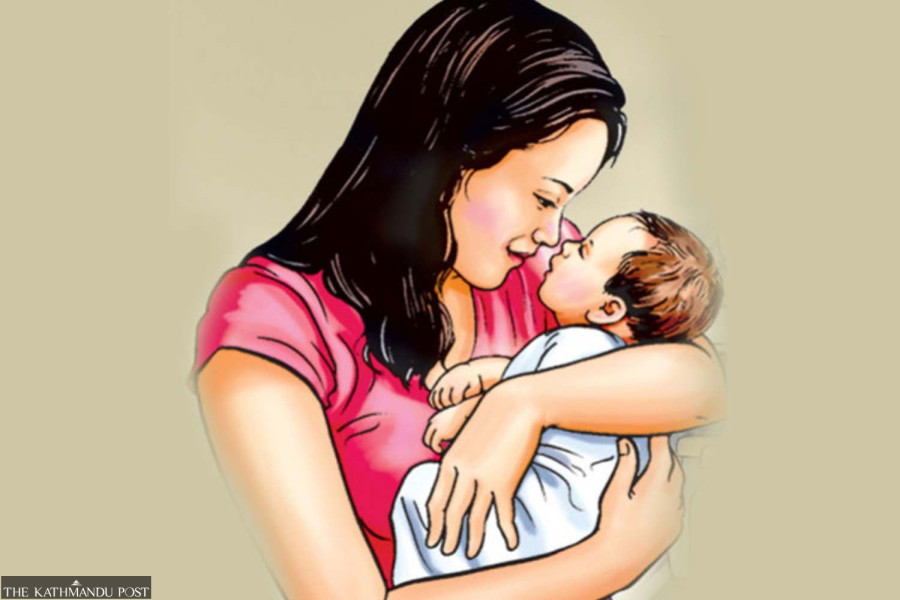Health
Government to hire 36 nurses to boost breastfeeding
Hospitals will get new nurses to promote breastfeeding after previous USAID-funded nurses were laid off following aid suspension.
Post Report
The Ministry of Health and Population plans to recruit 36 staff nurses at federal and provincial health facilities to promote exclusive breastfeeding practices, which have been steadily declining over the years.
The move aims to fill the gap left by the termination of staff nurse positions, previously funded by USAID to promote exclusive breastfeeding, following the aid agency’s closure.
Multiple crucial health care programmes in Nepal have been either affected or halted following the suspension of USAID funding.
“We don’t have funds for other federal nutrition programmes, but we have allocated a budget to hire two staff nurses each in 18 federal and provincial hospitals to promote exclusive breastfeeding practices,” said Lila Bikram Thapa, chief of Nutrition Section of the Family Welfare Division under the Department of Health Services. “We will also hire staff nurses in hospitals, where the service was available in the past.”
Officials hope that the deployment of specially trained nurses at federal and provincial hospitals will help promote exclusive breastfeeding practices.
Studies also show that Nepal’s exclusive breastfeeding rate has fallen over the years. According to the Nepal Demographic and Health Survey 2022, exclusive breastfeeding rate slipped consistently from 70 percent in 2011, to 56 percent in 2021.
The report also showed that bottle-feeding practices started at health facilities. It stated that 22 percent of children born in a health facility receive mixed milk feeding (breast milk and fresh, packaged, or powdered animal milk or infant formula), compared to 12 percent of those born at home.
The World Health Organisation discourages bottle feeding, stating that the nipple on a feeding bottle is prone to contamination and increases the risk of diseases in children.
What concerns health officials is that more educated and well-off mothers are less likely to breastfeed their babies, as studies show.
Doctors strongly recommend breastfeeding for the first two years of a baby’s life or longer, as breast milk lowers the risk of illness in children, promotes their recovery during an illness, and provides important nutrients for healthy growth and development.
According to them, longer durations of breastfeeding have many health benefits for women, including reduced risks of certain breast and ovarian cancers and diabetes.
Studies show that the proportion of children who are bottle-fed increases with mothers’ education, rising from 12 percent among children of mothers with no education to 49 percent among those whose mothers have more than a secondary education. Bottle-feeding is most common in the highest wealth quintile—46 percent—and least common in the lowest wealth quintile—11 percent.
Among the seven provinces of Nepal, exclusive breastfeeding rates are the highest in Sudurpaschim and Karnali provinces—74 percent each—and lowest in Lumbini Province—36 percent.
Health officials say that thousands of women seek delivery services at the hospitals selected to hire staff nurses for the promotion of exclusive breastfeeding.
Along with hiring trained health workers for exclusive breastfeeding promotion, health authorities have been working to set up at least 10 lactation management units in federal and provincial hospitals with the financial help of the United Nations Children’s Fund.
“Refrigerators to store breast milk for up to 48 hours will be provided to the hospitals, and training will be imparted to health workers to take out the breast milk and preserve it safely,” said Thapa.
Doctors recommend breastfeeding for the first two years of a baby’s life or longer, as breast milk lowers the risk of illness in children, promotes their recovery during illness, and provides important nutrients for healthy growth and development.
According to them, longer durations of breastfeeding have many health benefits for women, including reduced risks of certain breast and ovarian cancers and diabetes.
Nepal had committed to increasing the exclusive breastfeeding rate to more than 90 percent by 2030.




 20.06°C Kathmandu
20.06°C Kathmandu














